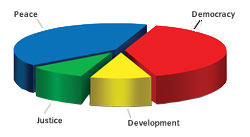|
|
Nepali lefties have always had a flair for pompous rhetoric. Pushpa Kamal Dahal and Babu Ram Bhattarai insist on using a paragraph to say what they can in one sentence.
So we have a 23-point agreement among the seven parties in which the communists commit themselves, once again, to constituent assembly elections.
Nepal has been declared a republic, but it will only take formal effect sometime in the middle of next year after it is ratified by the constituent assembly. But the king is in his palace, still paid a salary by taxpayers money.
The mixed election system has been slightly modified as a face-saving device for the Maoists, btu the essence of the earlier arithmetic remains in place. The 23-point agreement is what is already in the interim constitution and in previous accords.
Let's not go into why it took them so long. It's like asking why does the sun set in the west. The important thing is that the peace train which had stopped at a siding (not derailed as some cynics insisted in October when the Maoists left the government) is now on the move again. Essentially, it was never a problem between the leadership of the Maoists and the NC, it was a problem within their parties between the hardliners and moderates. The radicals, of course, are still not satisfied.
Janajatis have also gone along saying the elections are more important for now. Madhesi militant factions have denoucned it, but the Forum will take part. The rightwing RJP and RPP dubbed the deal undemocratic. China, India and UNMIN cautiously welcomed the new agreement. The scepticism is understandable because by their past behaviours the seven parties give us no reason to trust them this time.
Polls have been postponed twice. This time, if they fail to have elections by April, the leaders don't just lose face, they lose all legitimacy.
Still, from now till April there are three spoilers. Monarchists will try their damnedest to not allow elections to happen, an escalation in madesh violence would be a problem, and the wild followers of the Maoists will have to be defanged.
The YCL has harmed the prospects of its own parent party in elections, but the risk is that their excesses will be used by the hard right to wreck elections. Together, the six-party alliance and Maoists must finally prove they are capable of governing.
A government that can't ensure supply of essential commodities, arrange garbage disposal in the capital, guarantee freedom of movement and can't check crime is susceptible to sabotage by society's malcontents.
Nepalis don't want to hear any more speeches. The leaders must see elections as a chance to mend ways and improve their tarnished reputation among the public.



